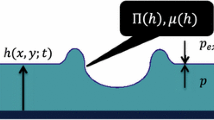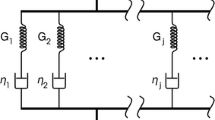Abstract
In this study, we have carried out fundamental research on lubricant depletion due to laser heating in thermally assisted magnetic recording. In particular, we investigated the effects of lubricant film thickness and lubricant bonding ratio on lubricant depletion. Conventional lubricants Zdol2000 and Ztetraol2000 were used. The lubricant depletion characteristics due to laser heating were found to depend largely on the lubricant film thickness and material. That is, for films thicker than one monolayer, the lubricant depletion depth increased with the laser-irradiation duration, whereas the thickness of the lubricant after laser irradiation on the diamond-like carbon (DLC) films tended to remain at a constant film thickness of one monolayer. The lubricant depletion width gradually increased as the laser irradiation duration increased. The increasing trends for the lubricant depletion width were quantitatively very similar and almost independent of the initial lubricant film thickness. However, for lubricant films with thicknesses less than one monolayer, the lubricant depletion depth was very small. The lubricant depletion width increased remarkably to several hundred micrometers as the laser irradiation duration increased. The lubricant depletion depth and width were much smaller for Ztetraol2000 than Zdol2000. In addition, the lubricant-bonding ratio was found to greatly affect the lubricant depletion characteristics due to laser heating. In other words, the lubricant depletion depth and width decreased as the bonding ratio increased. The lubricant depletion mechanism involves the evaporation of mobile lubricant molecules when the maximum attained temperature is less than 100 °C. Another suggested lubricant depletion mechanism involves the thermocapillary stress effect, which is induced by the disk surface temperature gradient resulting from the non-uniformity of the laser spot intensity distribution.











Similar content being viewed by others
References
Wu, L.: Presented at the symposium on frontier of magnetic hard disk drive technology and tribology, Santa Clara, California, USA, 23–24 June 2006
Zhang, J., Ji, R., Xu, J.W., Ng, J.K.P., Xu, B.X., Hu, S.B., Yuan, H.X., Piramanayagam, S.N.: Lubrication for heat-assisted magnetic recording media. IEEE Trans. Magn. 42(10), 2546–2548 (2006)
Tagawa, N., Yano, H., Mori. A.: Program and extended abstracts of 17th annual ASME conference on information storage and processing systems, pp. 171–173, Santa Clara, California, USA, 18–19 June 2007
Wu, L.: Modelling and simulation of the lubricant depletion process induced by laser heating in heat-assisted magnetic recording system. Nanotechnology 18, 1–8 (2007)
Tagawa, N., Kakitani, R., Tani, H., Iketani, N., Nakano, I.: Study of lubricant depletion induced by laser heating in thermally assisted magnetic recording systems’ effect of lubricant film materials. IEEE Trans. Magn. 45(2), 877–882 (2009)
Li, L., Jones, P.M., Hsia, Y.T.: Effect of chemical structure and molecular weight on high-temperature stability of some fomblin Z-type lubricants. Tribol. Lett. 16(1–2), 21–27 (2004)
Acknowledgments
This work was supported in part by the project “The development of innovative nanotechnology for the Tb/in2 class ultrahigh-recording-density information storage systems for supporting a ubiquitous society” of the High Technology Research Center of Kansai University, and by a grant from the Storage Research Consortium (SRC).
Author information
Authors and Affiliations
Corresponding author
Rights and permissions
About this article
Cite this article
Tagawa, N., Andoh, H. & Tani, H. Study on Lubricant Depletion Induced by Laser Heating in Thermally Assisted Magnetic Recording Systems: Effect of Lubricant Thickness and Bonding Ratio. Tribol Lett 37, 411–418 (2010). https://doi.org/10.1007/s11249-009-9533-4
Received:
Accepted:
Published:
Issue Date:
DOI: https://doi.org/10.1007/s11249-009-9533-4




